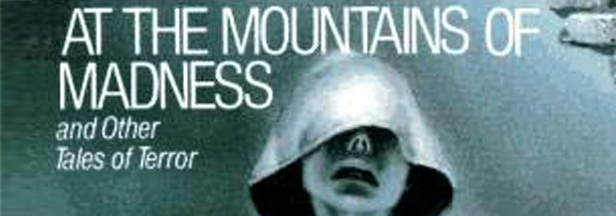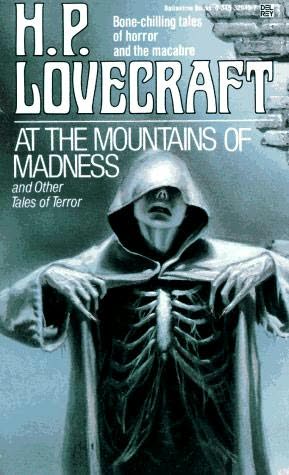Blog
Suspension of Disbelief in Classic Speculative Fiction

“I am forced into speech because men of science have refused to follow my advice without knowing why. It is altogether against my will that I tell my reasons for opposing this contemplated invasion of the antarctic – with its vast fossil hunt and its wholesale boring and melting of the ancient ice caps. And I am the more reluctant because my warning may be in vain.”
– At the Mountains of Madness, H.P. Lovecraft
I’m very drawn to projects that actively try to make their audience feel like what they’re watching is (or was at one point) real.
The “found footage” genre in movies is an obvious example. Titles like The Blair Witch Project and Cloverfield, as well as the more recent Chronicle and Paranormal Activity, all try to create something which appears as if it actually occurred. No one’s fooled, of course. We’re paying $10 to go see the thing in a theater, after all, but if it’s done right, there are moments where you can let yourself sort of forget the reality of the thing and buy into the possibility of something fantastic. If you want to…
Games are other obvious examples, primarily because a lot of them are actively trying to give you a truly virtual, interactive experience. Designers and companies like Ken Levine and Bethesda have dedicated their careers to the idea, and we’re all better off for it. A world without Bioshock or Skyrim isn’t a world I want to be in.
But, interestingly, these types of stylistic choices stretch back much farther than you might think. There are examples all throughout classic speculative fiction.
One of my favorite writers, H. P. Lovecraft, seemed to also be a fan of fabricated realism in stories. If you’re a fan, you know how visual and eerie the material is, which directly stems from his love of his story world. The Mythos was something he clearly enjoyed working in, and his attempts to make it feel weighted and real only add to its texture.
That and the fact that he was probably a little crazy…
Many of Lovecraft’s stories (and I’m sure there are other examples that pre-date him, I’m not suggesting he invented the idea) are literary versions of the “found footage” genre. A large portion of them weren’t written in a narrative style, but rather created as if they were the letters or journal entries of real people.
The effect is the same. Consciously you know what you’re reading is fiction, but the format allows you, should you so desire, to drop into the story in a real way. It allows you to believe. And belief can be a powerful thing.
Poe toyed with the idea in several stories, and another Edgar (Rice Burroughs) went so far as to write himself into his own yarns. Burroughs introduces his famous (and awesome, by the way) John Carter stories as “factual” accounts of a real life individual who had given him the manuscripts the reader is about to absorb.
And, of course, there’s one other, incredibly obvious example. Though not classic fiction per se (though it is inspired by it), one my favorites is Orson Welles’ adaptation of The War of the Worlds. For me, it’s a “catalyst”, one of a large group of things that led me to want to write my own stories, and it’s been a big influence on numerous other creators as well. I’m actually working on a project in a similar vein, tied to Conquered Earth, with a few filmmaker friends of mine, and every time I sit down with it, I can’t help but hear, “We take you now to Grover’s Mill, New Jersey.”
My English teacher in High School had the original broadcast on tape for her students to take home if they wanted. I think I was the only one that did, and I checked it out over and over. Even though it was dated, I loved the idea of experiencing something fantastic as if it were real.
Imagination has always been a powerful force for me, something that allowed me to be the characters I read in comics or books, to explore their worlds, live similar lives, have similar adventures. I think imagination, and more specifically, the suspension of disbelief, is the main reason I started writing.
There’s always a moment when I’m working that I forget I’m at a computer, tapping keys. For a few minutes at a time, I’m with my characters, wherever they are. It feels real, I believe it. And, like I said, belief is a powerful thing. It’s what keeps me coming back.
What films or books or games have managed to give you a moment of “belief” as you experienced them? I’m sure there’s tons out there I’ve never heard of.



Leave a Reply